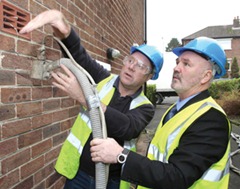Alex Maskey’s housing priorities
Alex Maskey MLA • Social Development Committee Chair
 The Programme for Government’s house building target does not go far enough and all sectors need to join together in a united drive to solve housing’s problems. Alex Maskey outlines his priorities for the province’s new housing strategy.
The Programme for Government’s house building target does not go far enough and all sectors need to join together in a united drive to solve housing’s problems. Alex Maskey outlines his priorities for the province’s new housing strategy.
Many of us take for granted the fact that we have a roof over our heads, either because we own our home or because we are able to rent a house or an apartment that meets our needs. For some people, however, this is an almost unobtainable dream.
The figures are stark: 40,000 on the Housing Executive waiting list for social housing, 20,000 of whom are deemed to be in housing stress. It is clear that the target of building 8,000 social and affordable homes by the end of this Spending Review period won’t come near to addressing this.
Many owner-occupiers find themselves having difficulty paying mortgages for homes that are now worth substantially less than just a few years ago. With more and more people defaulting, homelessness is on the increase and welfare reform may make these problems worse.
Housing issues therefore cut right across society, whether you are concerned about making mortgage payments, languishing on a seemingly never-ending waiting list for social housing or worst of all are made homeless.
The question therefore is, in a time of budgetary constraint and a poorly performing economy, what can we do to ensure that our serious housing situation doesn’t become a full-blown housing crisis?
It is evident to me that we can’t keep doing what we have been doing otherwise the situation will get worse. Similarly, tinkering around the edges will only put off the inevitable. A radical rethink of our approach to housing is required. That is why the department’s forthcoming housing strategy and the outcome of the review of the Housing Executive are so important.
 Key to the Housing Strategy must be a vision of where we want to go and the innovative and creative approaches to get there. It must include a roadmap to meet our acute housing need with the role of the private rented sector and housing associations in achieving this clearly defined.
Key to the Housing Strategy must be a vision of where we want to go and the innovative and creative approaches to get there. It must include a roadmap to meet our acute housing need with the role of the private rented sector and housing associations in achieving this clearly defined.
The strategy must present options for building a significantly greater number of social and affordable homes than the target currently set in the Programme for Government.
Housing may be a basic requirement for everyone but, in addition, it can positively impact on the economy. Attracting private investment will therefore be critical to future plans.
Proposals on the new social landlord model arising from the review of the Housing Executive will be of particular interest. This should include the potential to leverage funds using the existing stock for reinvestment in the development and maintenance of the housing stock. A requirement for any model will be to clearly establish the benefits to tenants. Importantly, any agreed changes must be implemented according to a clear timetable. This approach will help to ensure confidence of all stakeholders.
We must also consider the options for regulating the housing sector across all tenures. This will help all rented accommodation to meet the decent homes standard and protect tenants’ rights.
In my view we need to build a dialogue between the disparate elements of the housing sector. Specific sectoral interests are ultimately in nobody’s interest given the scale of the problem we face. The forthcoming housing strategy gives us an opportunity to have a much wider debate on how we prioritise housing in a social and economic context over the longer term.
We must make a commitment to a fair housing system with each sector playing their part. We must use whatever financial levers we can to increase supply to those most in need. We must regulate to ensure a fair playing field and improved standards.
A safe and secure home should be the right of everyone and we must have the ambition and drive to achieve that goal.





